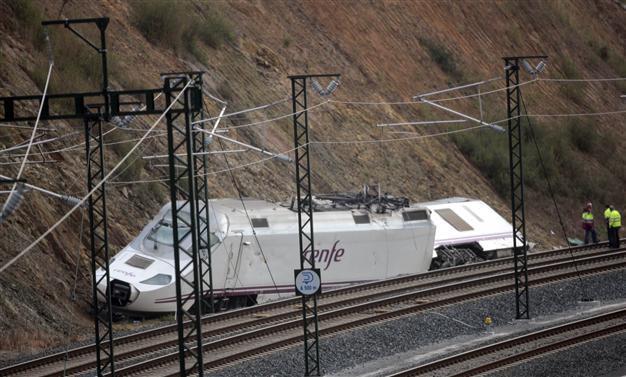Spain train driver on phone at time of deadly crash
MADRID - Agence France-Presse

REUTERS Photo
The driver of a train that derailed in Spain killing 79 people was on the phone to a coworker at the time of the accident, while the train was racing at nearly twice the speed limit, investigators said Tuesday.
The train's two data recording "black boxes" showed that moments before the crash the train was travelling at 192 kilometres (119 miles) per hour, said the Superior Court of Justice of Galicia, which is leading the investigation.
"Seconds before the accident the brakes were activated. It is estimated that at the time of the derailment the train was travelling at 153 kilometres an hour," it said in a statement.
The speed limit at the spot where the Madrid to Ferrol train derailed on Wednesday on the outskirts of Santiago de Compostela is 80 kilometres an hour.
The driver of the train was speaking on his work phone to staff members of state railway company Renfe and appeared to consult a map at the time of the accident, the court added.
"Minutes before the train came off the tracks he received a call on his work phone to get indications on the route he had to take to get to Ferrol. From the content of the conversation and background noise it seems that the driver consulted a map or paper document," it said.
The eight-carriage train flew off the tracks on a bend and ploughed into a concrete siding about four kilometres (2.5 miles) from Santiago in northwest Spain.
A US woman critically injured in the crash died in hospital on Sunday, bringing the toll to 79 including nine foreigners. It was Spain's deadliest train accident in decades.
Examining judge Luis Alaez on Sunday charged the driver, Francisco Jose Garzon Amo, with 79 counts of reckless homicide and released him under court supervision.
Garzon, 52, admitted during his court appearance Sunday that he had had a "lapse" of concentration, Spanish media have reported.
Several newspapers said the driver told the judge he had confused the stretch of track he was on at the time of the accident with another part of the route.
"He believed he was on a different section of the track and when he started to slow down it was too late to keep control of the train," El Pais wrote.
State railway track operator Adif is checking all tracks and security systems in its network in the wake of the accident, a company spokeswoman said.
"This is a precautionary measure. After what happened, the protocol is to review all systems to confirm that everything is working properly," she said.
The train was on a route that uses both high-speed and conventional track. On the high-speed sections a sophisticated security system automatically slows down trains that are going too fast.
The accident happened on a conventional section of the track where the older security system in place only automatically stops trains going above 200 kph and it is up to the driver to respond to prompts to slow down.
The driver had complained in the past about the security system in place at the spot of the accident did not automatically brake all speeding trains, a spokesman for the Galician branch of train drivers union Semaf said.
"He himself had said that it was incredible that speed was not controlled at this spot, that you could not go directly from 200 kph to 80 kph without the supervision of any security system," the spokesman, Rafael Rico, told AFP.
Renfe has said Garzon had been with the firm for 30 years, including 13 years as a driver, and had driven trains past the spot of the accident 60 times.
Sixty-six people caught up in the crash were still in hospital on Tuesday, 15 of them critically including one child, regional health authorities said.
Hundreds of mourners attended a memorial mass for the victims on Monday in the cathedral in Santiago de Compostela which was broadcast live on Spanish television.
Many aboard the train were Catholic pilgrims heading for Santiago's internationally celebrated annual festival honouring Saint James, a disciple of Jesus whose bones are said to rest in the city's cathedral.
